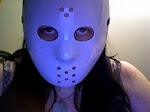
I reviewed the first book in this series,
Past Midnight, a few weeks ago. I really liked that book and had high hopes for this one.
One Hundred Candles picks up a few months after the previous book's events. It's Christmas and Charlotte isn't happy to be spending the holiday in an abandoned asylum, hunting for ghosts with her parents and a so-called demonologist. Charlotte is more than a little skeptical of the demonologist's abilities, but she changes her mind when his assistant suddenly appears to be possessed and attacks Charlotte. But after that, things seem to be back to normal at home. Charlotte's thrilled when a popular football player seems interested in her, especially when he asks her to prom. Attending prom is the epitome of normal to Charlotte, who's still working hard to overcome her family's weird profession.
As in the first book, there's a lot going on in this one beyond the main plot. Charlotte's parents aren't getting along, for one thing; her dad refuses to believe that anything supernatural happened during the demonologist's assistant's attack, while her mom is becoming more and more interested in new age spirituality to answer her questions. Charlotte's friend Noah has backed off abruptly, making sure she understands he just wants to remain friends--nothing more. And strange things are happening in Charlotte's high school, from ghostly images picked up on the security cameras to bizarre vandalism.
The book is realistic and compelling, just as good as the first one...until the end. It becomes clear partway through the book that a creepy entity is stalking Charlotte, but its big reveal was just a WTF moment. It didn't make any sense, and another character's explanation of it is even more nonsensical. Worst of all, the ending resolved nothing and only set up for a sequel that will in all likelihood be a retread of this book (since, you know, this book resolved nothing). And you know how much I love that.
One thing I found particularly irritating was the increased reliance on new-age spirituality to explain the supernatural events. It wasn't as pronounced in the first book, but in this one, Charlotte wears a big honkin crystal around her neck and gets advice from a generic 'wise woman' character who I freaking could not stand (because she made no sense, because she spoke in platitudes, because her new age mumbo-jumbo jarred against the realistic rest of the book, because she had no personality beyond being a cliche, because she was only in the book to provide wisdom and plot points). I really don't like that Charlotte's own rational skepticism is proven
wrong.
Charlotte's also a very passive character. Since that was something she was working on improving in the last book, it was depressing to see her revert to her old wishy-washy self--particularly since her own passiveness leads to a lot of bad things happening, which makes me feel the author's hand pretty clearly. Charlotte also misses some obvious clues and comes across as kind of dumb as a result.
I was very disappointed in the book, particularly since most of it is so good. The ending was crap with a cliffhanger denouement, not at all satisfying. While I'll undoubtedly read the next book in the series, if it has the same flaws I'll be more than a little cautious about picking up the author's future books.
B&N link










